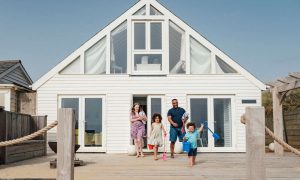When my husband and I bought our first vacation property, it was 2004, and we had been looking for an affordable ocean-front condo for a long time. The minute we opened the front door and saw the expanse of ocean before us, we were sold. A month later, we placed the condo in a rental program and started collecting monthly income.
Then, the 2008 crash happened. Real estate saw its lowest price drop in history. The sales price of our condo was cut to about half.
Now, what if I told you that, despite it all, that condo has given us one of the largest returns on our investment, in addition to providing a beach getaway for our family and friends? Real estate, if done properly, can be the best investment you ever make, despite what is happening in the market.
That’s because real estate always rebounds. Our condo value now far surpasses what we paid. But the true returns have come from rental income. When everyone else was losing money during the pandemic, the United States vacation rental market boomed. A well-maintained and advertised property can ensure decades of passive income coming to your pocket, and that’s important as the rest of the market fluctuates and life circumstances change.
Erin Carper, CFP, wealth advisor and owner of Carper Wealth Management in Atlanta, says that owning real estate can be a smart way to diversify your portfolio. “You have choices about where you can invest your money, and what you want to ask yourself is, ‘What is my goal with this money? What’s my objective? How much time can I leave my money in this investment? Do I want cash flow, or do I want to grow money, or both?’ If you want both, rental properties can provide that.”
Carper describes diversification this way: “If you were going to open an ice cream stand, you wouldn’t just serve vanilla, right? That’s not going to make you much money. You want a variety so that your risk is minimized. This way, you’re not counting on just one investment to make you money.”
But just like choosing a mutual fund, stock, or IRA, buying a vacation home takes research and an eye toward the future.
It starts with location. First, the home should be in a place you love, somewhere you will want to vacation for years to come, with enough square footage and amenities to provide for a changing family. Second, it should be located in a spot where other people like to vacation, preferably for more than one season. Think snowbirds, proximity to ski lifts, steps to the beach, accessibility to restaurants—anything people typically look for when choosing a vacation destination.
Mark Dollard, a broker associate with LIV Sotheby’s International Realty in Telluride, Colorado, has witnessed the explosion of real estate prices and rental income on homes that are favorably located and well-maintained. “Pay attention to what is trending—a city that is seeing big growth, a sport that draws people in, a certain marketplace that caters to a certain crowd. Then think about convenience … Renters (and buyers, when you’re ready to sell) value two things: convenience and outdoor living spaces.”
Once you’ve made your purchase, Dollard stresses the importance of keeping your vacation home updated and always paying attention to the market so that you can maximize your profit when you decide to sell. In our case, we purchased a Colorado vacation home less than three years ago and planned to hold on to it for at least a decade. But when everyone began working remotely and seeking a return to nature, a seller’s market emerged. We put our vacation home on the market, had multiple offers within days, and nearly doubled our investment. That’s in addition to the hefty rental income we brought in, thanks to three seasons each year that drew visitors to our mountain getaway.
Did we put money into our place? Absolutely. Did we get a nice return on our investment? A hearty yes—much better than anywhere else.
So what do you need to know about investing in a vacation home that you plan to either rent or just own and sell at a premium? Experts offer these tips:
- Use your rental as a tax deduction. “A huge benefit of turning your vacation home into a rental is that you can write off your expenses on your taxes, and you can take a depreciation amount set by the IRS, which increases your net profit in the years you own the home,” said Carper. “If you can purchase the property without taking out a mortgage, every dollar you earn is yours to keep. This also guards against having to make a mortgage payment in months when you don’t collect rental income.”
- Be aware that both the risk and the benefit are all on you. “The benefit,” Carper says, “is you get to make all the decisions about your investment. And of course, you get to enjoy it, escape your daily life, be somewhere you love. But unlike a mutual fund, where your money is spread out among several corporations, this is one investment, one house. If it goes through a rough patch—a hurricane, for instance—it’s 100% affected.
- Give yourself a financial cushion to get through rough patches. Make sure you can make the payments when there are no renters, or when a pipe breaks, or when an appliance quits working and requires an emergency fix to keep the renters happy. In the case of a condo, be prepared for special assessments on major repairs and maintenance items—resurfacing the community pool or replacing the roof, for example.
- Make sure you are not restricted from reaching your goals. Dollard points out that municipalities may limit what you can do, buildings may have Homeowners’ Associations (HOA) restrictions, and neighborhoods may not allow short term rentals. Historic residential neighborhoods have even more special restrictions. Know the rules before you purchase any property, especially one you plan to rent.
- Recognize who your target market will be and ask yourself if the demand matches it. “Don’t buy a house four miles outside of town when everyone wants to be in town,” said Dollard. “If the majority of your market is family, make your home kid-friendly. Anticipate the needs of your market. If you are buying for appreciation value, first and foremost pay attention to supply. You want to buy in a place where the inventory is fixed. If the town can build indefinitely, it’s not a great place to buy. You want high demand, low inventory.”
- Hire a management company to advertise and care for your property. Sure, you will have to pay them a cut of your rental income, but the peace of mind will be priceless. Good rental management companies will get your home noticed, manage all of a guest’s needs, and alert you to any problems that need addressing. If you want to save some money, take on the yearly deep-clean, and do as much of the maintenance on the property as you’re capable of.
The cost of upkeep, taxes, insurance, remodeling, and furnishing all need to be weighed when purchasing an investment property. But most real estate appreciates in value, and it’s one of the few investments you get to enjoy yourself. Passive income, family time, handsome profits upon selling—if you do it right, your vacation home can do it all.
The post How to Make a Vacation Home Your Most Lucrative Investment appeared first on Better Homes & Gardens
Original source: Better Homes & Gardens



